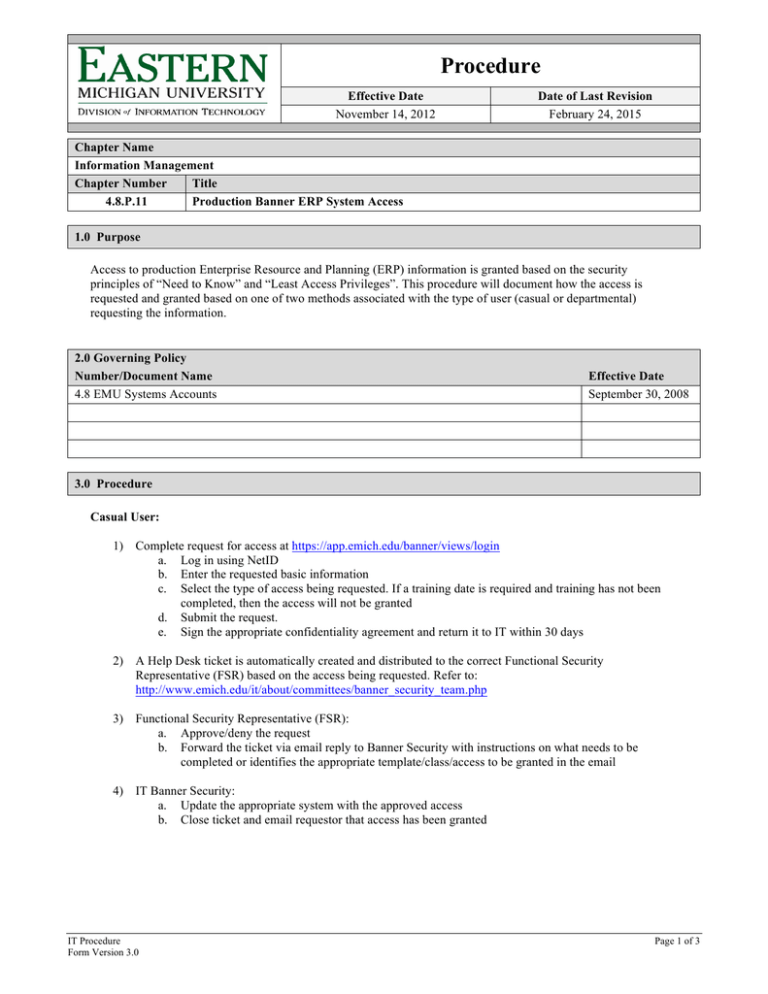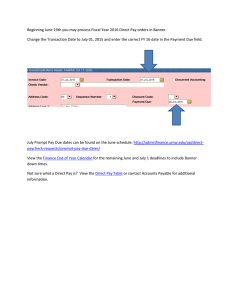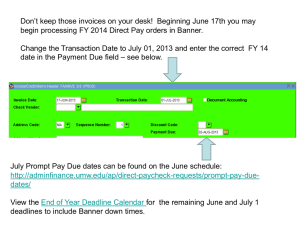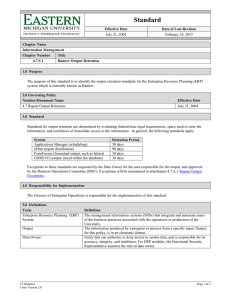Procedure
advertisement

Procedure Effective Date November 14, 2012 Date of Last Revision February 24, 2015 Chapter Name Information Management Chapter Number Title 4.8.P.11 Production Banner ERP System Access 1.0 Purpose Access to production Enterprise Resource and Planning (ERP) information is granted based on the security principles of “Need to Know” and “Least Access Privileges”. This procedure will document how the access is requested and granted based on one of two methods associated with the type of user (casual or departmental) requesting the information. 2.0 Governing Policy Number/Document Name 4.8 EMU Systems Accounts Effective Date September 30, 2008 3.0 Procedure Casual User: 1) Complete request for access at https://app.emich.edu/banner/views/login a. Log in using NetID b. Enter the requested basic information c. Select the type of access being requested. If a training date is required and training has not been completed, then the access will not be granted d. Submit the request. e. Sign the appropriate confidentiality agreement and return it to IT within 30 days 2) A Help Desk ticket is automatically created and distributed to the correct Functional Security Representative (FSR) based on the access being requested. Refer to: http://www.emich.edu/it/about/committees/banner_security_team.php 3) Functional Security Representative (FSR): a. Approve/deny the request b. Forward the ticket via email reply to Banner Security with instructions on what needs to be completed or identifies the appropriate template/class/access to be granted in the email 4) IT Banner Security: a. Update the appropriate system with the approved access b. Close ticket and email requestor that access has been granted IT Procedure Form Version 3.0 Page 1 of 3 Departmental User: 1) The initial step varies depending on the module a. For Advancement module access, the FSR processes the initial request on behalf of the departmental user. If additional access is necessary, the departmental user needs to contact the FSR to discuss additional access. b. For all other modules, contact the appropriate FSR directly to discuss the type of work being done that will require access to an ERP system. 2) FSR: a. b. c. d. Contact data owner if different from the FSR, if requested access differs from job responsibility template Request via email a new security class/template be created (optional) Request via email modifications to security class/template (optional) Send an email to it-banner-security@list2.emich.edu approving access and designating the appropriate security class/template as well as any additional access approved 3) IT Operations will: a. Create ticket listing FSR as the client b. Assign to Banner Security 4) IT Security will: a. Ensure that all affected FSRs have approved the request if it crosses module boundaries b. Update all ERP systems with the appropriate access c. Close ticket with indication that request has been processed d. Follow up to be sure that the appropriate confidentiality agreement is on file and signed. If the agreement is not signed and returned to IT within 30 days, access may be suspended Special Processing for access: Supervisors are contacted for verification of student employees and graduate assistant access needs to student information. Supervisors are contacted anytime the FSR has a concern regarding the access being requested. 4.0 Responsibility for Implementation The Director of Enterprise Operations is responsible for the implementation of this procedure. 5.0 Definitions Term Casual User Departmental user Data Owner ERP System Functional Security Representative (FSR) IT Procedure Definition A general user with access to basic system features to perform their job responsibilities. A back office user with additional access needs. A data owner is an entity that can authorize or deny access to certain data, and is responsible for its accuracy, integrity, and timeliness. For ERP modules, the Functional Security Representative assumes the role of data owner. Enterprise Resource Planning (ERP) includes Banner INB, Banner Workflow, Banner Document Management System (BDMS – Xtender), BI/BOE and other relevant third party software. An entity that can authorize or deny access to data within the ERP module that they are responsible for. Page 2 of 3 6.0 Revision History Description Initial Draft – audit response Updated by Lynnette Rose and the Policy Committee Updated by Lynnette Rose IT Policy Committee First Review IT Policy Committee Second Review Approved by CIO IT Procedure Approval Date January 8, 2015 February 5, 2015 February 24, 2015 Page 3 of 3



